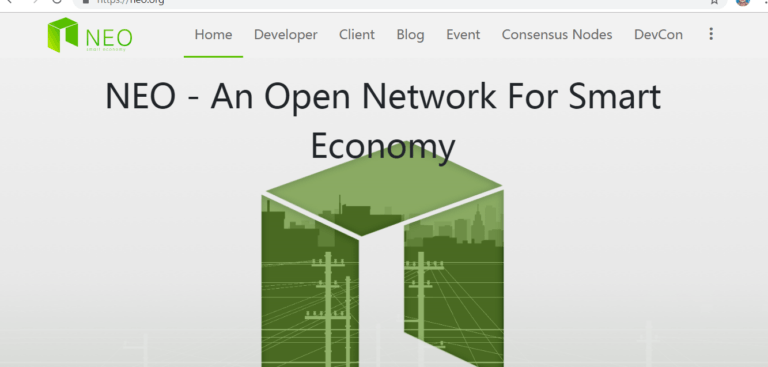Erik Zhang, the co-founder of NEO, one of the leading blockchain-based platforms for developing decentralized applications (dApps) and issuing smart contracts, recently revealed that he “doesn’t care about NEO’s price and market capitalization at all.”
Zhang, a self-taught computer programmer and graduate of Shanghai University, explained that his main role at NEO is to work on the blockchain-enabled platform’s ongoing development. His comments came during an interview with CCN (published on January 14th) in which he clarified that Da Hongfei, NEO’s other co-founder, focuses on “promoting” the platform.
Not Concerned About Prices
As one of the leading core developers for NEO, Zhang said he is mainly interested in improving the platform’s functionality. In December 2018, he reminded his followers (via Twitter):
NEO’s vision is to serve the smart economy and support large-scale commercial applications, which has never changed. The smart economy is based on the digital economy, which is an economic system that digitizes assets and transfers, pays, and trades them on the Internet.
During his CCN interview, Zhang stated that he wasn’t interested in prices because his goal is to develop “a blockchain project instead of playing a capital game.” When questioned about his views regarding Ethereum (ETH), Zhang acknowledged that it is a “great project” but he wants people to know that NEO is very different from Ethereum.
NEO uses the delegated Byzantine Fault Tolerant (dBFT) consensus protocol, which is similar to the basic proof-of-stake (PoS) consensus mechanism. However, dBFT’s developers have made modifications to the first version of PoS (introduced in 2012) in an effort improve it.
Trying To Create A Better Version Of Proof-of-Stake
Meanwhile, Ethereum is scheduled for its Constantinople upgrade which is expected to be activated in the next few days. Although Ethereum will also transition to a PoS-based consensus algorithm when Ethereum 2.0 goes live, the platform’s developers don’t intend to make this change anytime soon.
In addition to using a fundamentally different consensus algorithm than Ethereum, NEO’s development team has placed more emphasis on regulatory compliance. Although both Ethereum and NEO allow users to issue digital tokens or coins, the latter requires investors to verify their identities. After completing ID checks, NEO’s software system assigns users a unique digital identity.
As crypto enthusiasts know, China’s government had launched a nationwide crackdown on crypto-related businesses towards the end of 2017. The nation’s regulatory authorities had heightened their scrutiny of projects or firms dealing in digital currencies due to the large number of scams carried out under the guise of initial coin offerings (ICOs).
NEO Is A Global Project, Not Restricted To China
NEO’s China-based development team has been working to ensure that their platform complies with the appropriate regulatory requirements. However, Zhang pointed out: “Although it was initiated by two Chinese people, I believe that the founder’s nationality is not the nationality of the project.”
Going on to elaborate on the main differences between Ethereum and NEO, Zhang noted:
NEO and Ethereum both have their own tokens. They can all run turing-complete smart contracts. But they also have a big difference. First, their consensus mechanisms are different. Ethereum uses a PoW algorithm, while NEO uses the dBFT algorithm.
He continued:
Second, their smart contract development languages are very different. Ethereum uses a domain-specific language called Solidity, while NEO uses general-purpose languages with a large number of developers, such as C#, Python, Java, Golang, JavaScript, etc.
Zhang also mentioned that Ethereum uses fairly simple interfaces for smart contract development – which is mainly done using Ethereum’s virtual machine (EVM) instruction set.
NEO, on the other hand, offers “a large number of powerful APIs for smart contracts, and they are provided in a way [that is] similar to virtual devices”, Zhang said.
Improving Network In Order To Build Large-Scale Apps
According to Zhang, Ethereum aims to be an unstoppable “world computer” whereas NEO wants to create a “smart economy” based on the digitization of assets. Clarifying the Chinese government’s stance regarding cryptoassets, Zhang said:
[Cryptocurrency] trading is not illegal. Exchanges are illegal. This won’t hurt NEO, or the damage to NEO is the same as any other projects. You cannot trade NEO or other tokens on Chinese exchanges. But you can legally trade NEO or other tokens in other countries.
At present, NEO’s development team is focused on creating enterprise level applications for commercial use, Zhang stated. He added that the platform’s developers were currently working on improving “NEO’s infrastructure” in order to achieve higher throughput (transactions per second), while also creating a “more reliable dBFT consensus algorithm.” This, Zhang explained, is required because the NEO platform must be ready to handle large-scale applications.
On December 24th, 2019, Zhang tweeted:
[In addition to] the development of infrastructure [for NEO], we are looking for some applicable scenarios, such as games. This is part of moving towards smart economy.
On December 28th, NEO’s developers revealed they had upgraded the NEO virtual machine (NeoVM). As Zhang noted, the NeoVM features “stack isolation” which is “now available for deployment outside the NEO network … With the expansion of NeoContact, we are one step closer to the vision of becoming the most developer-friendly public chain.”
NEO DevCon Scheduled For February 16-17 2019
NEO’s team is also reportedly in the process of making key improvements to the platform’s dBFT consensus algorithm. Notably, Zhang claims that “dBFT will become the best consensus mechanism for blockchains.”
More important updates being worked on include created “a distributed storage network” called NeoFS, Zhang revealed. This, he said, will allow “applications [to] store massive amounts of data. The development of the first release candidate (RC1) of NeoFS is expected to be completed in Q3 2019.”
During the NEO DevCoin conference in Seattle (scheduled for February 16-17 2019), Zhang plans to “share more details” about the progress that has been made with developing NeoFS.
Confirming that NEO’s network is scheduled for a “major update next year” called NEO 3.0, Zhang said the upgrade will require “at least one hard fork.”
Final Technical Details For NEO 3.0 Still Not Ready
He also said that the upgrades could involve “starting a new blockchain network, [and] then migrating all the old data to the new chain.” However, the “final technical implementation” is “still under discussion” and “will not be implemented until next year”, Zhang clarified.
Expressing views somewhat similar to those shared recently by Kyle Samani, the co-founder of Multicoin Capital, Zhang believes:
Ethereum will sooner or later exceed Bitcoin and get the first position. But Ethereum will also face very fierce competition from other projects such as NEO.








